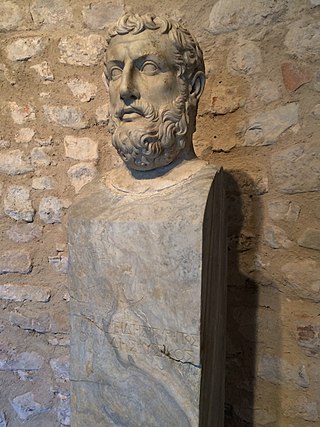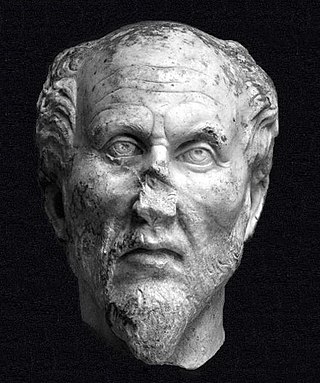Related Research Articles

Plato, born Aristocles, was an ancient Greek philosopher of the Classical period who is considered a foundational thinker in Western philosophy and an innovator of the written dialogue and dialectic forms. He raised problems for what became all the major areas of both theoretical philosophy and practical philosophy, and was the founder of the Platonic Academy, a philosophical school in Athens where Plato taught the doctrines that would later become known as Platonism.

Parmenides of Elea was a pre-Socratic Greek philosopher from Elea in Magna Graecia.

Proclus Lycius, called Proclus the Successor, was a Greek Neoplatonist philosopher, one of the last major classical philosophers of late antiquity. He set forth one of the most elaborate and fully developed systems of Neoplatonism and, through later interpreters and translators, exerted an influence on Byzantine philosophy, Early Islamic philosophy, Scholastic philosophy, and German Idealism, especially G.W.F. Hegel, who called Proclus's Platonic Theology "the true turning point or transition from ancient to modern times, from ancient philosophy to Christianity."

Plotinus was a Greek Platonist philosopher, born and raised in Roman Egypt. Plotinus is regarded by modern scholarship as the founder of Neoplatonism. His teacher was the self-taught philosopher Ammonius Saccas, who belonged to the Platonic tradition. Historians of the 19th century invented the term "neoplatonism" and applied it to refer to Plotinus and his philosophy, which was vastly influential during late antiquity, the Middle Ages, and the Renaissance. Much of the biographical information about Plotinus comes from Porphyry's preface to his edition of Plotinus' most notable literary work, The Enneads. In his metaphysical writings, Plotinus described three fundamental principles: the One, the Intellect, and the Soul. His works have inspired centuries of pagan, Jewish, Christian, Gnostic, and early Islamic metaphysicians and mystics, including developing precepts that influence mainstream theological concepts within religions, such as his work on duality of the One in two metaphysical states.

Zeno of Elea was a pre-Socratic Greek philosopher from Elea, in Southern Italy. He was a student of Parmenides and one of the Eleatics. Zeno defended his instructor's belief in monism, the idea that only one single entity exists that makes up all of reality. He rejected the existence of space, time, and motion. To disprove these concepts, he developed a series of paradoxes to demonstrate why they are impossible. Though his original writings are lost, subsequent descriptions by Plato, Aristotle, Diogenes Laertius, and Simplicius of Cilicia have allowed study of his ideas.
Ancient Greek philosophy arose in the 6th century BC. Philosophy was used to make sense of the world using reason. It dealt with a wide variety of subjects, including astronomy, epistemology, mathematics, political philosophy, ethics, metaphysics, ontology, logic, biology, rhetoric and aesthetics. Greek philosophy continued throughout the Hellenistic period and later evolved into Roman philosophy.

Parmenides is one of the dialogues of Plato. It is widely considered to be one of the most challenging and enigmatic of Plato's dialogues. The Parmenides purports to be an account of a meeting between the two great philosophers of the Eleatic school, Parmenides and Zeno of Elea, and a young Socrates. The occasion of the meeting was the reading by Zeno of his treatise defending Parmenidean monism against those partisans of plurality who asserted that Parmenides' supposition that there is a one gives rise to intolerable absurdities and contradictions. The dialogue is set during a supposed meeting between Parmenides and Zeno of Elea in Socrates' hometown of Athens. This dialogue is chronologically the earliest of all as Socrates is only nineteen years old here. It is also notable that he takes the position of the student here while Parmenides serves as the lecturer.
Gregory Vlastos was a preeminent scholar of ancient philosophy, and author of many works on Plato and Socrates. He transformed the analysis of classical philosophy by applying techniques of modern analytic philosophy to restate and evaluate the views of Socrates and Plato.

Platonism is the philosophy of Plato and philosophical systems closely derived from it, though contemporary Platonists do not necessarily accept all doctrines of Plato. Platonism has had a profound effect on Western thought. At the most fundamental level, Platonism affirms the existence of abstract objects, which are asserted to exist in a third realm distinct from both the sensible external world and from the internal world of consciousness, and is the opposite of nominalism. This can apply to properties, types, propositions, meanings, numbers, sets, truth values, and so on. Philosophers who affirm the existence of abstract objects are sometimes called Platonists; those who deny their existence are sometimes called nominalists. The terms "Platonism" and "nominalism" also have established senses in the history of philosophy. They denote positions that have little to do with the modern notion of an abstract object.

Eric Alfred Havelock was a British classicist who spent most of his life in Canada and the United States. He was a professor at the University of Toronto and was active in the Canadian socialist movement during the 1930s. In the 1960s and 1970s, he served as chair of the classics departments at both Harvard and Yale. Although he was trained in the turn-of-the-20th-century Oxbridge tradition of classical studies, which saw Greek intellectual history as an unbroken chain of related ideas, Havelock broke radically with his own teachers and proposed an entirely new model for understanding the classical world, based on a sharp division between literature of the 6th and 5th centuries BC on the one hand, and that of the 4th on the other.
The Statesman, also known by its Latin title, Politicus, is a Socratic dialogue written by Plato. The text depicts a conversation among Socrates, the mathematician Theodorus, another person named Socrates, and an unnamed philosopher from Elea referred to as "the Stranger". It is ostensibly an attempt to arrive at a definition of "statesman," as opposed to "sophist" or "philosopher" and is presented as following the action of the Sophist.
The Sophist is a Platonic dialogue from the philosopher's late period, most likely written in 360 BC. In it the interlocutors, led by Eleatic Stranger employ the method of division in order to classify and define the sophist and describe his essential attributes and differentia vis a vis the philosopher and statesman. Like its sequel, the Statesman, the dialogue is unusual in that Socrates is present but plays only a minor role. Instead, the Eleatic Stranger takes the lead in the discussion. Because Socrates is silent, it is difficult to attribute the views put forward by the Eleatic Stranger to Plato, beyond the difficulty inherent in taking any character to be an author's "mouthpiece".
Julia Elizabeth Annas is a British philosopher who has taught in the United States for the last quarter-century. She is Regents Professor of Philosophy Emerita at the University of Arizona.
In philosophy and specifically metaphysics, the theory of Forms, theory of Ideas, Platonic idealism, or Platonic realism is a theory widely credited to the Classical Greek philosopher Plato. The theory suggests that the physical world is not as real or true as "Forms". According to this theory, Forms—conventionally capitalized and also commonly translated as "Ideas"—are the non-physical, timeless, absolute, and unchangeable essences of all things, of which objects and matter in the physical world are merely imitations. Plato speaks of these entities only through the characters in his dialogues who sometimes suggest that these Forms are the only objects of study that can provide knowledge.
Mary Louise Gill is the David Benedict Professor of Classics and Philosophy at Brown University. Her work primarily focuses on Plato, Aristotle, and other ancient philosophers.
Kenneth M. Sayre was an American philosopher who spent most of his career at the University of Notre Dame (ND). His early career was devoted mainly to philosophic applications of artificial intelligence, cybernetics, and information theory. Later on his main interests shifted to Plato, philosophy of mind, and environmental philosophy. His retirement in 2014 was marked by publication of a history of ND's Philosophy Department, Adventures in Philosophy at Notre Dame.

Many interpreters of Plato held that his writings contain passages with double meanings, called allegories, symbols, or myths, that give the dialogues layers of figurative meaning in addition to their usual literal meaning. These allegorical interpretations of Plato were dominant for more than fifteen hundred years, from about the 1st century CE through the Renaissance and into the 18th century, and were advocated by major Platonist philosophers such as Plotinus, Porphyry, Syrianus, Proclus, and Marsilio Ficino. Beginning with Philo of Alexandria, these views influenced the Jewish, Christian, and Islamic interpretation of these religions' respective sacred scriptures. They spread widely during the Renaissance and contributed to the fashion for allegory among poets such as Dante Alighieri, Edmund Spenser, and William Shakespeare.
Plato's so-called unwritten doctrines are metaphysical theories ascribed to him by his students and other ancient philosophers but not clearly formulated in his writings. In recent research, they are sometimes known as Plato's 'principle theory' because they involve two fundamental principles from which the rest of the system derives. Plato is thought to have orally expounded these doctrines to Aristotle and the other students in the Academy and they were afterwards transmitted to later generations.
Charles H. Kahn was a classicist and professor emeritus of philosophy at the University of Pennsylvania. His work focused on early Greek philosophy, up to the times of Plato. His 1960 monograph on Anaximander was still as of 2020 the most important reference work on the subject, and his 1979 edition of the Heraclitus fragments likewise remained the most widely cited English translation of Heraclitus, more or less representing the 'standard interpretation' for non-expert scholars.

The Italian school of pre-Socratic philosophy refers to Ancient Greek philosophers in Italy or Magna Graecia in the 6th and 5th century BC. Contemporary scholarship disputes the Italian school as a historical school rather than simply a geographical one.
References
- ↑ Anonymous. "Retiring Professors Honored". Vassar Alumnae/i Quarterly. Retrieved May 30, 2015.